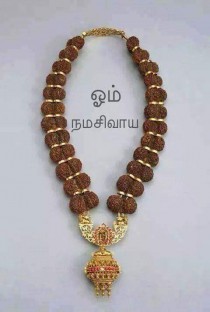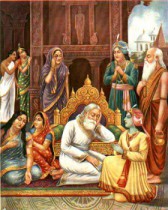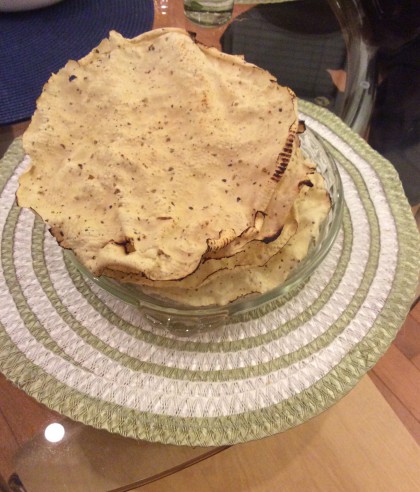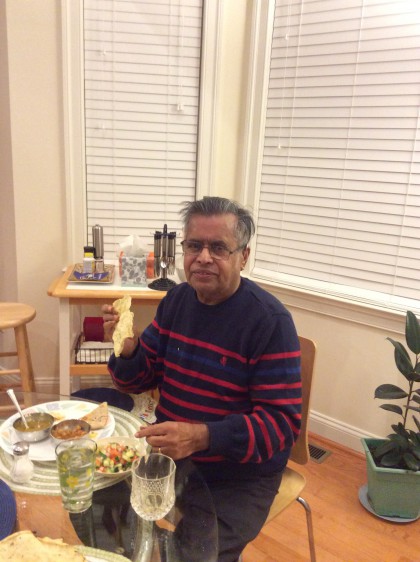While treading the tedious, tormenting forests, following her husband’s steps, and even subsequently, the horrible incidents of her last day in the Palace would have been haunting Sita.
But, in captivity under the simsupa tree in the the Asoka grove of Ravana, her nightmare might have been the day of kidnapping by the demon king and her misjudgment of Lakshmana’s character and the rebukes, she showered on him.
‘How could Kaikeyi mother be so cruel to hand over the bark pieces for me to wear, she herself being a woman!’, Sita would have mused, for several days after leaving Ayodhya. ‘She cared neither for her heart-broken husband nor for the respected seniors like Sumantra and Sidhartha who pleaded with her to reconsider her arrogant and unjustified imposition to the king. She didn’t not care even for Raja Guru VasishtA’s advice.
‘There was not even a shade of change in her face,’ says the saint poet:
नैवसाक्षुभ्यते देवी न च स्म परिदूयते |
न चास्या मुखवर्णस्य विक्रिया लक्ष्यते तदा || २-३५-३७
naivasaakshubhyate devii na cha sma pariduuyate |
na chaasyaa mukhavarNasya vikriyaa lakshyate tadaa || 2-35-37
That queen Kaikeyi, however, was neither excited nor repented in her heart nor was any change observed in the colour of her face.
Her mukhavarnam remained the same!
Once it was clear that the cruel woman would never change her imposition, the king orders to provide plenty of weapons, fighters and all materials required for a fearless and comfortable living in the forest for Rama, but even that was not agreeable to Kaikeyi.
aayudhaani cha mukhyaani naagaraaH shakaTaani cha |
anugachchhantu kaakutthsam vyaadhaashchaaraNyagocharaaH || 2-36-5
“Let important weapons, chiefs of police and vehicles, hunters knowing the secrets of forest accompany Rama(scion of Kakutsa)”
धान्य कोशः च यः कश्चित् धन कोशः च मामकः |
तौ रामम् अनुगच्चेताम् वसन्तम् निर्जने वने || २-३६-७
dhaanya koshaH ca yaH kashcit dhana koshaH ca maamakaH |
tau raamam anugacchetaam vasantam nirjane vane || 2-36-7
Let the granary and the treasury belonging to me be sent to Rama residing in the uninhabited forest.
No, even that was not acceptable to Kaikeyi.
How could Kaikeyi be so cruel ? We too wonder.
अथ चीराणि कैकेयी स्वयम् आहृत्य राघवम् |
उवाच परिधत्स्व इति जन ओघे निरपत्रपा || २-३७-६
‘Put these on,’ she told Rama to wear the bark pieces, she herself had brought shamelessly, to the gathering of men.
परिधत्स्व इति demanded Kaikeyi- ‘don these’
She, निरपत्रपा – shameless ( woman ).
Rama and Lakshmana wore the ascetic garb but Sita struggled with those when Rama helped her to wear them.
What a treatment to the eldest daughter in law of the great Raghuvamsam!
Sita’s leaving the palace was her decision but Kaikeyi endorsed and encouraged it. She also opposed the orders of the king to send men and materials for a comfortable living in the forest. It was a well planned strategy to keep Rama away from Ayodhya, along with his wife and most loving brother so that Bharatha’s throne is safe and secure.
A careful study of these two chapters will reveal that there was a concealed ambition in Kaikeyi’s mind to make her son the monarch by somehow sidelining Rama. Mandara became an ignition torch. Selfishness was in Kaikeyi’s blood .
For me, it looks that the palace coup was well planned in advance, in Kaikeyi’s mind.



